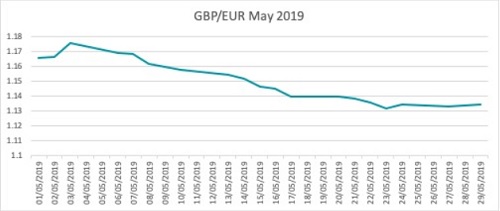Sterling/Euro Exchange Rate Review May 2019
Thursday 06 June 2019
The Pound to Euro exchange rate followed a downward trend during May, as Brexit and UK political uncertainty dominated sentiment, writes Ben Scott of Global Reach.
Last month started well for the British currency, and the Pound to Euro exchange rate reached interbank levels of €1.17, approaching €1.18.

The Bank of England (BoE) had suggested that a tightening of interest rates could occur, and cross-party talks had been rumoured to be productive.
Labour leader Jeremy Corbyn’s suggestion that parliament must ‘get a deal done’ caused a rise in Sterling, but it began to feel the heat when comments came from Labour’s Shadow Chancellor John McDonnell suggesting Theresa May had ‘blown the confidentiality’ the two parties had, and ‘jeopardised’ the talks.
Additionally, weighing on Sterling, was positive German factory orders data which marked its first increase in three months, alleviating some of the concerns over the productivity of the Eurozone’s largest economy.
Cross-Party Talks Fall Flat
As news came in that cross-party talks had hit a dead-end, and markets started to assess the successors to Theresa May, things got worse. May’s successors are expected to be pro-leave, which could put a no-deal Brexit back on the table, which would likely impact both the economy and the Pound.
As the month went on the Pound continued to decline consistently against the Euro, while reaching its lowest level since February against the US Dollar (GBP/USD), as markets anticipated news of Theresa May resigning.
Economic Data
Meanwhile, economic data in the Eurozone disappointed, but the Euro managed to shrug it off.
The German ZEW Survey for Economic Sentiment dropped to -2.1 in May, failing to reach economists’ forecasts of +5.0. ZEW President Achim Wambach suggested: ‘The decline in the ZEW indicator of economic sentiment shows that the financial market experts continue to expect restrained economic growth in Germany for the next six months. The most recent escalation in the trade dispute between the USA and China again increases the uncertainty regarding German exports, a key factor for the growth of the gross domestic product.’
The UK average weekly earnings figure for the three months through March on the year fell on May 14th, slipping from 3.5% to 3.2%. The UK employment change stat for the same time period also failed to live up to expectations, coming in at 99K rather than the 141K forecast following the previous 179K reading. However, the unemployment rate did manage to improve, shifting from 3.9% to 3.8%, the lowest rate since 1974.
By May 20th, Theresa May was attempting one more amendment to her deal, but the Conservative Party were already looking for her replacement, and the leadership race began. Sterling hit a three-month low against the Euro by May 21st. The British currency bounced slightly when Theresa May announced her resignation on the 24th, but then resumed its decline.
On 22nd May showed UK inflation was on the rise, up to 2.1% in April—the first time above the 2.0% mark in four months—up from 1.9% in March. The core measure held steady at 1.8%.
By the end of the month, the European elections were in clear focus. Nigel Farage’s Brexit Party won the most seats in the UK, but more people voted for pro-EU parties in total.
Meanwhile, the European Central Bank (ECB) meeting minutes released at the end of the month highlighted concerns among policymakers over the currency bloc’s economic recovery — another hint monetary stimulus may need to occur.
On the last day of the month, the German Consumer price index showed only 0.4% growth in May, meaning the annual figure slipped from 2.0%, past the 1.6% forecast, to 1.4%.
GBP/EUR Exchange Rate Forecast
The Pound to Euro currency pair could be in for more politically driven market movement in the coming months as Theresa May steps down, and a replacement steps up.
If a no-deal Brexit seems likely, the Pound could experience some sharp declines. Boris Johnson has suggested that should he be in power, the UK will leave the EU on October 31st, with or without a deal.
The damage a no-deal Brexit could do to the economy remains to be seen, but the uncertainty could pressure the Pound significantly lower.
Meanwhile, Eurozone economic data could create EUR exchange rate movement as markets gauge the currency bloc’s economic performance. Markets will be watching data to determine if or when the European Central Bank (ECB) might want to take action to support the economy with its monetary policy plans, especially after the last meeting minutes confirmed their concerns.
More comments from ECB policymakers suggesting the central bank needs to look to do more could put pressure on the Euro.
Ben Scott
Global Reach
Thank you for showing an interest in our News section.
Our News section is no longer being published although our catalogue of articles remains in place.
If you found our News useful, please have a look at France Insider, our subscription based News service with in-depth analysis, or our authoritative Guides to France.
If you require advice and assistance with the purchase of French property and moving to France, then take a look at the France Insider Property Clinic.





